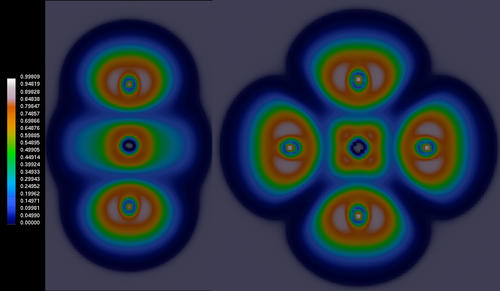Quantum-Chemistry
One of the important tools in our workgroup is quantum-chemistry. Based on the calculations at a very high level of theory, the thermochemical and sometimes even kinetic stability of mostly instable und even unknown molecules can be estimated, and possible routes to their syntheses can be devised. Furthermore, the properties of these molecules can also be calculated in order to support their experimental identification. For example, matrix-isolated molecules are in many cases characterized by their vibrational spectra, and the assignment of the bands is often impossible without the comparison with very accurate calculated spectra.
Furthermore, modern quantum-chemical methods offer other interesting possibilities for chemists, e.g. the analysis of electronic structures and bonding situations.
Some quantum-chemistry programs used in our group:
| Methods | Program |
| DFT | |
|
MP2 SCS-MP2 |
|
| CCSD(T) | |
| MR | |
| Sonstige |
AFM |
Review
Extreme Oxidation States of Transition Metals
T. Schlöder, S. Riedel, in Comprehensive Inorganic Chemistry, Vol. 9 (Ed.: S. Alvarez), Elsevier, 2013, 227–243.

